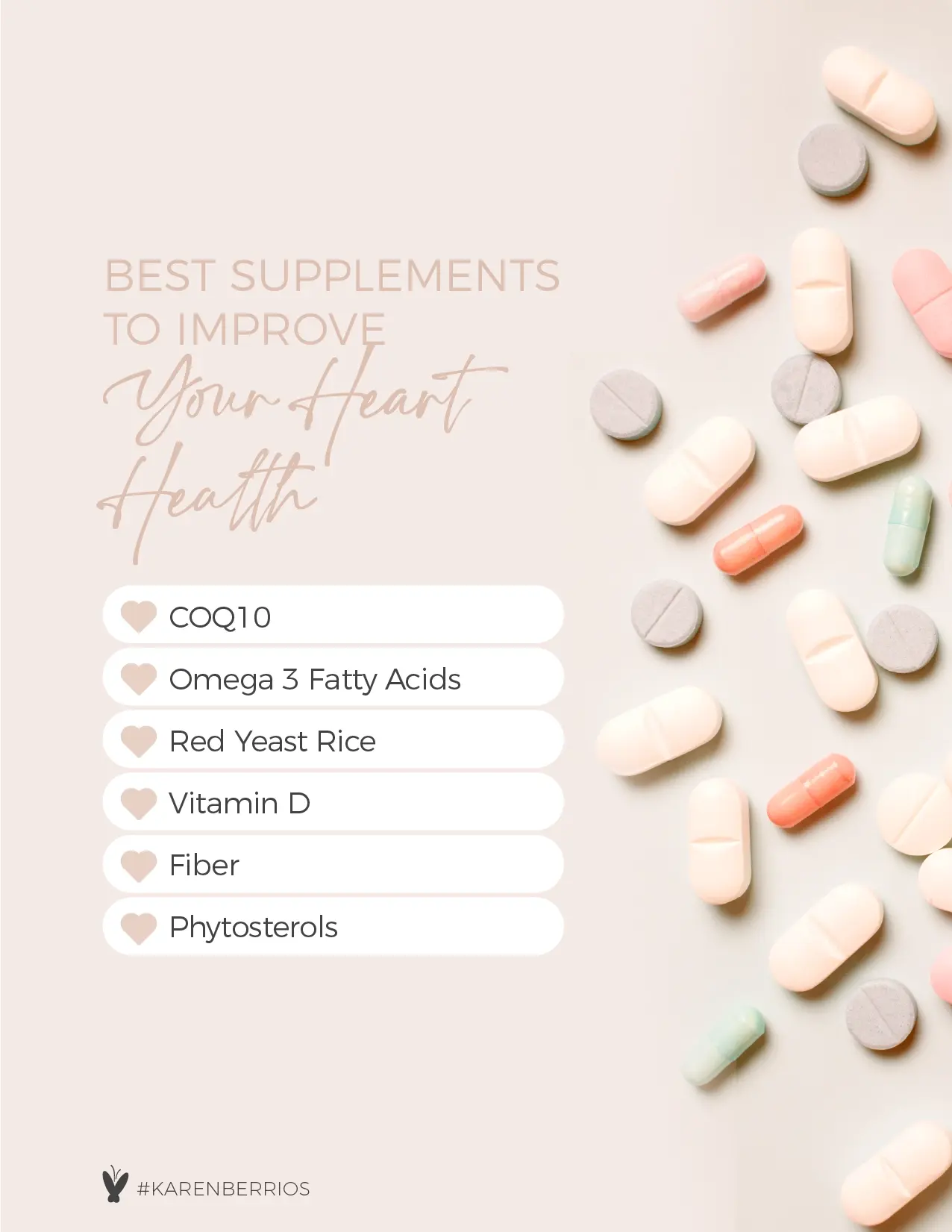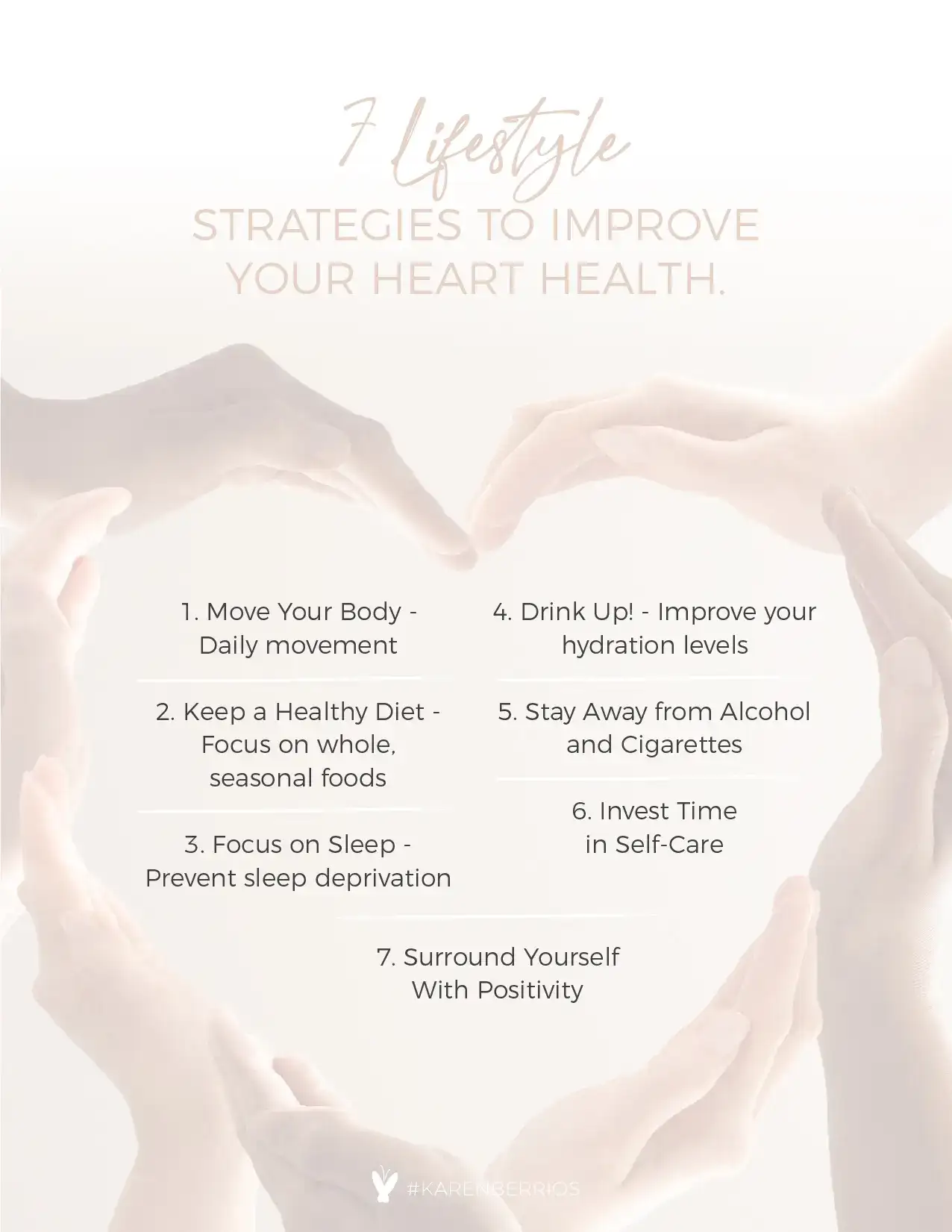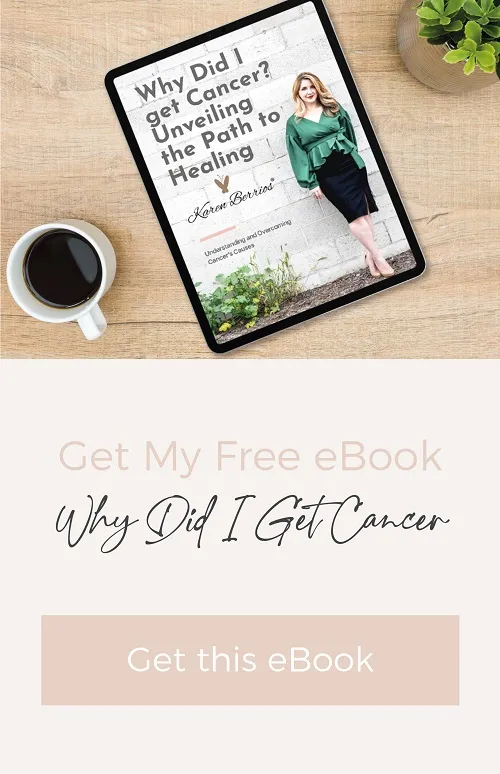

7 Lifestyle Strategies to Improve Your Heart Health
7 Lifestyle Strategies. During my healing journey, I realized how many different things go into play for every aspect of health. Focusing on just one part of it wasn’t going to help me, and I needed to find tools that improve everything, from my immune system and hormones to mental and heart health. Only by encompassing the body as a whole, was I able to tackle my illness and truly heal.
Your heart is the most important muscle in your body, and it’s constantly working. Everything you do, including how much you move, what you eat, how restful your sleep is, and what your stress levels are, impacts your heart health. Most of us don’t think about it as much as we should, and we definitely don’t implement tactics into our daily lives that our hearts would benefit from. Here, I want to share with you the 7 lifestyle strategies that will help improve your heart health and contribute to your overall well-being.
Move Your Body
As humans, we are made to move. Our complex yet simple skeletal construction, with strong leg muscles, allows us to be fast, agile, and nimble. As we get older, keeping our machines in favorable condition gets harder and harder to do. And that’s why the only key is consistency. Throughout the last few decades, studies have repeatedly shown how incredible exercise is for our overall health, including cardiovascular. It helps you maintain a healthy weight, keeps your cholesterol and blood pressure in normal ranges, and protects your heart and blood vessels from damage.
Aerobic exercise like running, jogging, cycling, or brisk walking improves circulation, and resistance training strengthens the heart muscle, so aim for introducing both into your workouts. Most of us are guilty of spending too many hours in a seated position, slowly transitioning into the dreaded sedentary lifestyle that’s linked to a multitude of diseases. That’s why my number one lifestyle strategy includes daily movement, in whatever way, shape, or form you desire.
Keep a Healthy Diet
We truly are what we eat, and the choices we make when we put the food on our plates have a significant impact on every aspect of our health. Food has the power to heal, but it can also wreak havoc in our entire system, creating inflammation and making it hard for our cells to repair, recharge, and heal.
Ultra-processed food that’s rich in trans-saturated fats, sugar, and artificial ingredients is known to increase the risk of heart disease by clogging blood vessels and elevating blood pressure. These foods are additionally increasing the risk factors for a variety of other physical and mental health diseases, from cancer and autoimmune diseases to eating disorders.
On the other hand, focusing on clean, whole foods that come from a trusted source and are rich in vitamins and minerals, will do wonders for your health and help decrease these heart disease risk factors. A heart-healthy diet is predominantly plant-based and it includes plenty of seasonal fruits and vegetables, beans and legumes, nuts and seeds, complex carbohydrates, and plant-based protein. If you eat meat or fish, make sure it comes from a trusted, organic source and that it’s either wild-caught or responsibly farmed.
Research shows how specific supplements can help improve your heart health. Here are some of the most studied:
- CoQ10 – this incredible antioxidant is produced in all of our cells, but the highest concentration is in our hearts. Still, its levels decrease with age, which is why supplementation may be the smartest approach. CoQ10 has an important role in energy metabolism, and studies show how it reduces oxidative stress and blood pressure, and with it, mortality from cardiovascular diseases.
- Omega 3 Fatty Acids – Omegas have been praised for heart health for decades, but new studies show their ability to reduce blood triglyceride levels, as well as the number of strokes and heart attacks. Whether you get it from fatty fish or a supplement, Omegas are a great dietary addition to help improve your heart health.
- Red Yeast Rice – some studies show how red yeast rice can be used instead of statin drugs for reducing cholesterol as it’s more safe and natural. Still, ensure you’re taking it from a trusted source and there’s no citrinin as many red yeast rice supplements contain this toxic compounds.
- Vitamin D – plenty of people are vitamin D deficient, which can bring on a plethora of health issues, including increased risks of high blood pressure. Supplementing with vitamin D is known to improve overall health, but consult with your physician before adding it to your diet.
- Fiber – The standard American diet is pretty low in fiber, which is why it’s considered to be one of the greatest risks for inflammation and coronary diseases. Research shows how adding more fiber into your diet can improve your blood pressure, blood sugar levels, and more, lowering your risk of heart attack and strokes.
- Phytosterols – these natural plant compounds are shown to significantly lower LDL cholesterol levels, when combined with an overall healthy diet.
Focus on Sleep
Sleep is often underrated, and the only actual time we stop and think about our sleeping habits is when we’re sick and our bodies crave rest. Sleep is the only time when all of the cells in our bodies get a moment to recharge and repair whatever damage might be caused to them. That’s the time when our immune system gets more powerful, our muscles grow, our hair and nails go through a transformation, and also when our heart goes down to its resting heart rate.
Sleep deprivation has been linked to a plethora of health conditions, from high blood pressure and heart disease to inability to concentrate and poor immune system health. This is why this lifestyle strategy is so important, and making simple and easy changes can already help immensely.
Try to go to sleep and wake up around the same time each day. This creates consistency and a better adaptation to the natural circadian rhythm. Remove all technology from your bedroom and make it a dark, moderately-temperature haven where your body and mind can relax and rest. Don’t eat too close to bedtime so your body has enough time to digest the food, and limit your exposure to blue-light emitting technology at least one to two hours before bed so your body can naturally produce melatonin, the most important sleep hormone.
Drink Up!
Our bodies are mostly made of water, and staying adequately hydrated throughout the entire day is crucial for overall health, including heart health. Making sure our cells are always hydrated helps reduce long-term risks of heart disease as well as enables healthy and natural detoxification. An easy way to ensure you stay hydrated is by investing in a good water bottle that you can refill and keep with you at all times. You can also set reminders on your phone every hour so you can take a break and drink up. Making this heart-healthy lifestyle change is an easy one, it just requires consistency and commitment.
Stay Away from Alcohol and Cigarettes
Alcohol is one of those known vices that isn’t as vilified as cigarettes and other drugs, but its impact is just as detrimental. There is a very clear link between drinking too much alcohol and high blood pressure, which over time puts a high strain on your heart and increases the risk of heart attack and stroke. If you don’t want to abstain from alcohol completely or cannot quit cold turkey, try to at least limit it to only occasional situations and always make sure to drink plenty of water so you avoid dehydration.
Cigarettes, on the other hand, stopped being a social thing a long time ago, and with all the terrible study conclusions, it’s only safe to say that quitting is the only real way of making sure it’s not damaging your short and long-term health.
Invest Time in Self-Care
Self-care is the optimal way of dealing with stress and helping yourself find a way to relax. It’s going to look different for almost all of us, but it’s an important part of our daily life that shouldn’t be neglected. For me, self-care encompasses being in the present moment, spending time with my family, long walks on the beach, meditation, and prayer. I find peace and comfort in these little self-care moments that keep my stress levels on the low, giving my body enough opportunity to heal. In this fast-paced and stressful world, I urge you to find something you truly enjoy doing and carve out the time for yourself.
Mindfulness, specifically, has been proven to help reduce blood pressure as well as overall sedentary time, showing how powerful this practice can be. In another study, stroke survivors who practiced Tai Chi for three months were able to recover and improve their arm and hand function, sitting balance, and overall quality of life. Investing in self-care and stress-reducing activities is crucial in improving and maintaining good heart health.
Surround Yourself With Positivity
A strong support system is one of the most important parts of healing and overall long-term well-being. You might be wondering what having friends and family around you actually has to do with your heart health, and the answer is: plenty! Your emotional health is just as important as your physical and mental health, and having a circle of uplifting and positive people will help boost your motivation, inspiration, and overall confidence, which is so often lost when you’re dealing with a disease.
Pets play another incredible role in heart health, helping you lower your stress and with it, blood pressure. Spend more time with your furry companions and enjoy the health benefits.
Having positivity around you, whether in the form of a support group, family, or friends, is crucial for lowering your stress levels and helping improve your heart health, as well as overall health in general.
Final Thoughts
Our health is our greatest fortune, which is why investing in these lifestyles and making the necessary changes is the best thing you can do for yourself. Start small and gradually keep making these changes, building consistency, and helping prevent heart disease one mindful breath at a time.
Related Post

hey there
I'm Karen!
I have found my cancer journey to be a positive and profound transformational experience. I’m inspired to share my healing journey here, and trust you’ll find hope, encouragement and purpose as you discover the healing power that lies within you.
Join
The Mailing List!
By signing up for my newsletter, you agree with our Privacy Policy and Terms & Conditions.




